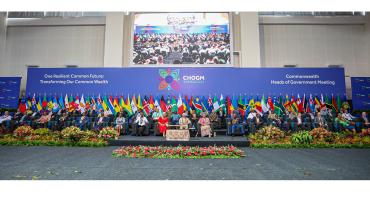Commonwealth Secretariat, Commonwealth of Learning, Microsoft, and UNESCO lead efforts for the first ICT in Education Leadership Forum in Barbados
Championing the use of information and communication technology (ICT) in education was the focus of an ICT in Education Leadership Forum held in Bridgetown, Barbados, from 25 to 26 January 2012.
The multi-stakeholder event, organised by the Commonwealth Secretariat, Commonwealth of Learning (COL), Microsoft and UNESCO, brought together almost 70 ICT in Education policy leaders, including 12 permanent secretaries, from across the Commonwealth Caribbean states.
COL President Sir John Daniel, who spoke at the forum, said: “The Caribbean is beginning to make good progress in integrating ICT into education and giving priority to the training of teachers in the use of ICT in their classrooms. Having computers without teachers with the skills to use them as an education tool is a waste of opportunity. Teachers also need good materials, so part of the forum will be devoted to the promotion of Open Educational Resources.”
Max Everest-Phillips, Director of the Governance and Institutional Development Division of the Commonwealth Secretariat, said: “The forum provides a unique opportunity to bring together key stakeholders to discuss pragmatic and tangible steps to inculcate ICT in all aspects of the curriculum – a necessary task for any twenty-first century knowledge economy. The partnership was previously instrumental in the successful implementation of the UNESCO ICT Competency Framework in Guyana, and will be critical to subsequent implementations across the Caribbean.”
The Forum focused on the theme 'Teachers’ Creativity and Innovation: A Key to Success in the Caribbean', and explored the integration of ICT in teaching and learning. It specifically looked at how policies and practices needed to harness the potential of ICTs in teacher development. Participants developed working solutions, with practical strategies on how governments and education systems can work together to deliver engaging, relevant and authentic education experiences through the use of ICTs.
Frances Correia, General Manager for Microsoft in Trinidad and Tobago, Eastern and Southern Caribbean, sees the potential benefits of ICT in education.
“Microsoft’s early partnership with UNESCO to create the UNESCO ICT Competency Framework for Teachers was driven by the belief that access to ICT is not enough. We need to shift teacher training to competency-based models to truly see the transformative potential of ICTs in Education. The partnership with the Secretariat and Commonwealth of Learning presents the impact that such a focus can have.”
UNESCO’s Assistant Director-General for Communication and Information, Janis Karklins, also underlined the organisation’s long-term commitment to support states in incorporating the framework into their national curriculums.
“The ICT Competency Framework for Teachers (CFT) is aimed at helping countries to develop comprehensive national teacher ICT competency policies and standards, and should be seen as an important component of an overall ICT in education master plan. UNESCO stands ready to support national initiatives for the use of the ICT CFT to strengthen teacher education,” said Mr Karklins.
Delegates discussed key barriers to the adoption of these techniques, access being primary among them, and they also met with multilaterals and donor-organisations to explore opportunities for collaboration and partnership.
A website has been created to share information more broadly across the Caribbean: http//www.ictf2012.org



